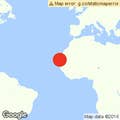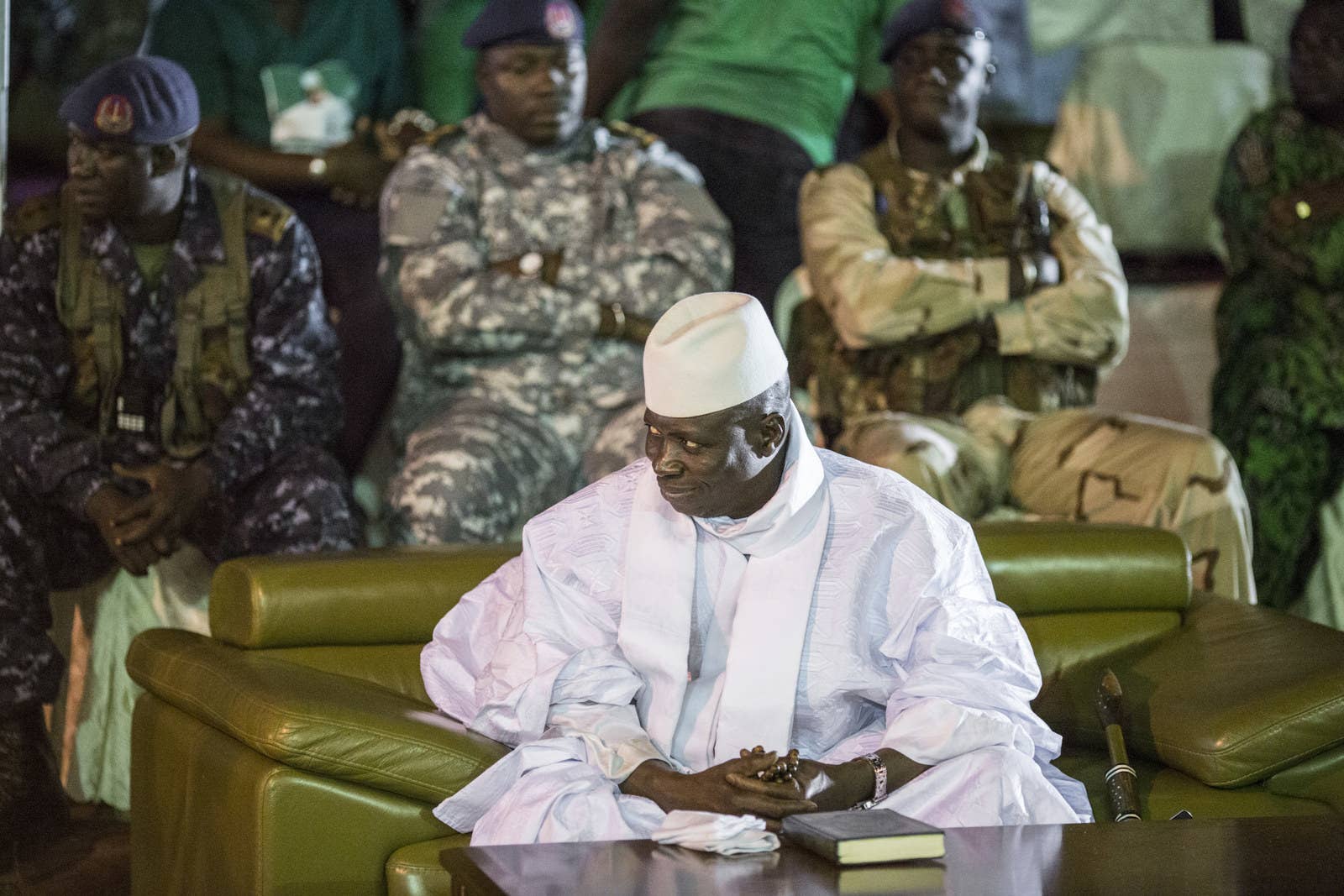
DAKAR, Senegal — By 4 p.m. on Thursday, Ebou Jarjue could no longer take it. As historic elections unfolded in Gambia, the nerves that had steeled him through eight years of working directly under the country’s volatile dictator were shredded.
The 49-year-old had once been Yahya Jammeh’s personal butler and saw up close the brutality of the man who ruled with an iron fist for 22 years. Working grueling dawn-to-dusk hours, Jarjue took care of everything from serving food to polishing the silver, always under the watchful eye of one of the president’s personal bodyguards. In 2008, his former boss had rewarded his service by abruptly throwing him into prison, where he endured solitary confinement for nearly five years before escaping across the border into Senegal.
Now it appeared Jammeh might finally be ousted from power — with Gambia going to the polls at the end of last week, he faced a credible opposition for the first time in over two decades. A coalition had rallied around Adama Barrow, a soft-spoken former security guard turned businessman, and many thought he could win. But the election was unfolding away from the prying eyes of the outside world after Jammeh blocked international calls and internet access hours before polls opened.
Desperate to know what was happening, Jarjue called some friends, scraped together what money he could, and flagged down a rickety bus in Dakar, Senegal’s capital city. Three hours later, he was in Karang, a scruffy border outpost a few miles from Gambia.
There, he was close enough to the border to hop onto a Gambian cell phone network. Phone lines within the country were open, and he could pick up Gambian state television, where the results slowly started trickling in.
“I was nervous,” said Jarjue in a phone interview after Barrow's victory, for the first time feeling free to speak out about his life under Jammeh. “What we [were] seeing had never happened in Gambia.”
Jarjue hadn’t been back to Gambia since he fled, but the elections reminded him of the two he’d witnessed in State House, the president’s official residence in Banjul, the capital.
“Normally at election time, all the ministers and military men come. They will sit in the cabinet room — there’s a big TV screen there.”
His job was to keep the food and drinks flowing for Jammeh and the regime’s top brass. So he kept his head down and, shadowed by a bodyguard, tried to forget what he heard the men talking about.
Jarjue said he witnessed the same routine after election victories in 2001 and 2006: “The next morning, I would spend the whole day with [Jammeh] by the beach. State House is located very close to the beach, so he opens the downstairs door and then they have an all-day party.”
Jammeh was fond of long phone conversations, his onetime butler remembered, and ate dinner at odd hours, usually around 2 a.m., but often later. He would lavish his staff with gifts of money on a whim — but always in front of visiting dignitaries, to show off his supposed largesse. His favorite television show was Animal Kingdom, said Jarjue, a nature series that centers around wild animals outwitting each other, typically with brutal consequences.
“He really loved Animal Kingdom. You can’t imagine. It’s crazy. He will be watching Animal Kingdom until 3 a.m., that’s his favorite.”
His staff tiptoed around Jammeh, wary of his mercurial temper, said Jarjue: “Sometimes he will call you to his sitting room and just start shouting.” Whenever they came back from a dressing-down, his staff would close the door behind them with frozen smiles. Any hint of questioning the president’s authority was dangerous.
After surviving numerous coup attempts during two decades at the helm, Jammeh became increasingly paranoid. With each new effort to unseat him, the list of enemies he saw around him grew bigger.
In a constantly tense atmosphere, Jarjue now thinks it was inevitable he was eventually caught up in the president’s growing web of paranoia.
“The last group of people I worked with are all exiled in Senegal now. He accused everybody of poisoning him.” He paused. “There I was risking my life — his food, I will always taste it first. After all that, he accused me of poisoning him.”
Tasting the president’s food wasn’t a job requirement. Jarjue took it upon himself partly out of self-preservation; he preferred to run the risk of getting poisoned himself than face the consequences if it happened to his boss.
But even that strategy did little to keep him safe.
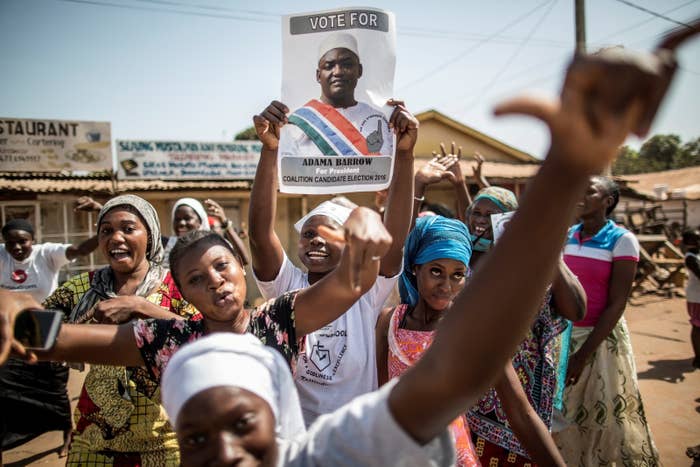
A tiny slither of a country tucked into Senegal on Africa’s west coast, Gambia has bucked the political trend of 2016. When the results came out, Barrow’s coalition had won with 45% of the vote, and the authoritarian Jammeh had been peacefully ousted. Amid a global lurch toward populist demagogues, the country is also a continental outlier. Many Gambians have proudly celebrated Jammeh’s subsequent concession as a rare example among a tenacious clutch of African strongmen who have vowed to die in office.
Within minutes of Barrow’s win, residents began cheering in the streets of the capital, and the joy was echoed across the diaspora. Tens of thousands of the country’s 2 million–strong population have left Gambia, some forced into exile simply for being connected to those who’d fallen foul of the regime.
Celebrations poured in from across the world. “Oh my god, two days without sleeping but we did it! We did it team Gambia,” Mama Linguerre Sar, a popular US-based dissident, said to her thousands of followers on Friday afternoon.
Some sounded dazed, struggling to put their feelings into words. For others, elation was mingled with anger.
- @Kambi_Gooners I remember grand aunt Mariama Ann, who love us so much, killed by Jammeh motorcade and nothing came out of it #IAm220
No one knows how many have died under Jammeh’s regime. Rights groups say “countless” people have been subjected to arbitrary imprisonment, torture, and enforced disappearances. His last targets were the people who joined growing antigovernment protests this year that eventually helped pushed him out.
In April, an opposition activist named Solo Sandeng stood on a busy street corner near the capital and unfurled a banner that read: “We need proper electoral reform.” Hundreds joined in support. Security officials quickly swooped in, and the arrests that day were typically arbitrary; one woman was a bystander who was waiting for a taxi at the time. Sandeng himself was among three who later died in mysterious circumstances in jail.
Fatoumata Sandeng, his daughter, led rallies calling for her father’s body to be released. To date, that hasn’t happened, although the government eventually released a death certificate saying Sandeng had died in prison of “shock” and “respiratory failure.”
At 2 a.m. the day after elections, as results started rolling in, Fatoumata logged onto Facebook. “My Father used to stay up all night to count the votes. I am staying up for him tonight, taking note,” she wrote. “Av got you daddy..🏽️🏽️”
By 4 p.m., when the shocking results were in, she wrote: “Alhamdulillah [thank God].”
After a suspenseful few hours in which it wasn’t clear Jammeh had accepted his defeat, Sandeng commended him for finally accepting the results.
Others weren’t as forgiving.
Some called for him to face the International Criminal Court (ICC), which Jammeh had said last month he would withdraw Gambia from. “ICC … this man deserves all torture he can get,” one poster wrote.
“I want all [these] imams … to stop preaching to us about forgiveness,” another poster wrote. “Where were u all when jammeh was killing the innocent good citizens who where out there seeking for better future for u an i.”
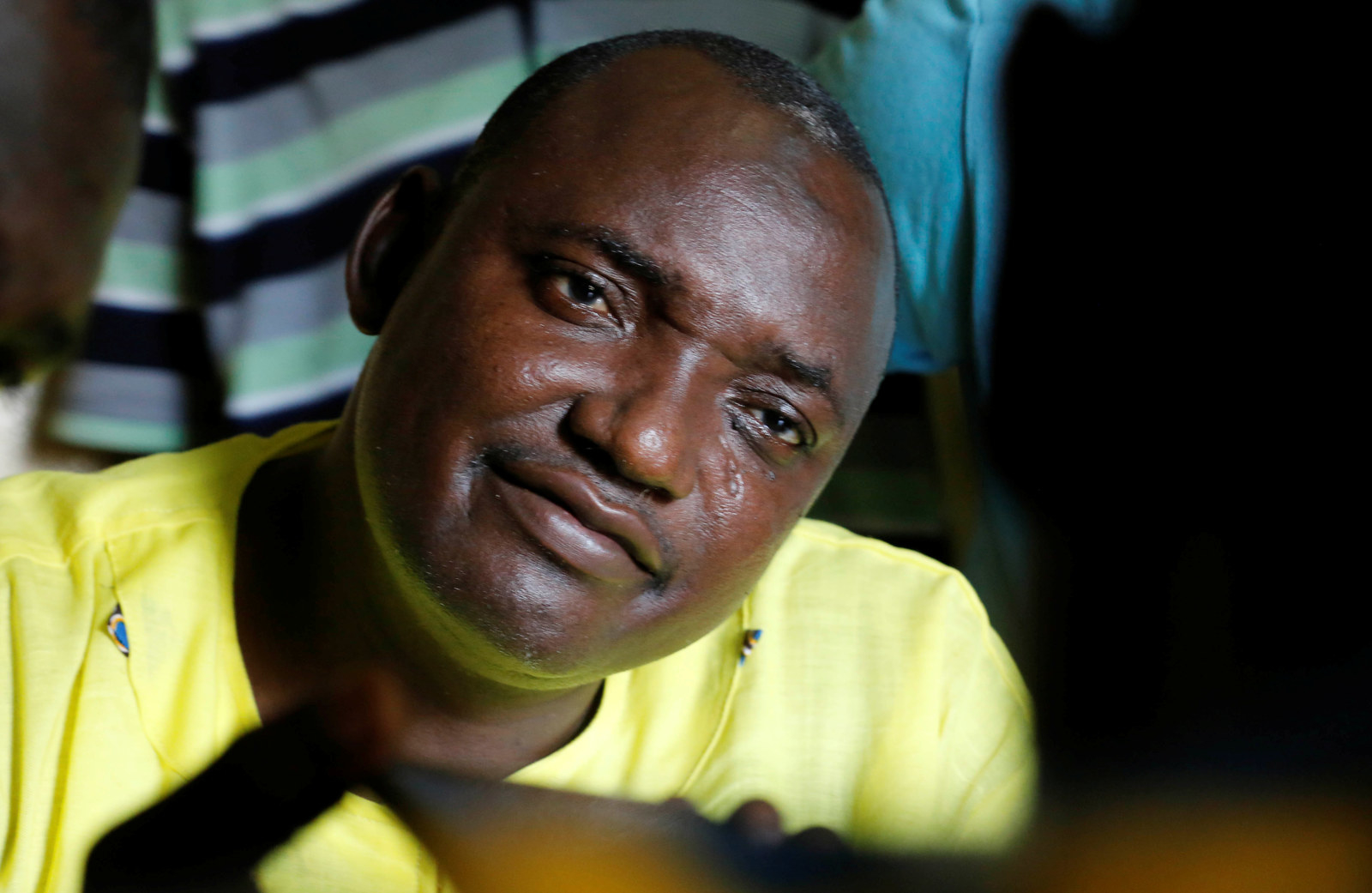
Lamin Njai hasn’t stopped crying since election results came in. “I thank God for life, for witnessing this particular day we have been waiting for so, so long.” He paused to compose himself. “I just wish my cousin could have been here and witnessed this day, and we danced together.”
Njai’s family were among the thousands who suffered the frequent collective punishment used by the dictator to shut down dissent. Njai’s cousin, Lamine Sanneh, was his closest friend, a taciturn man who had risen through the army ranks to become the commander of Jammeh’s presidential guards. “We were so proud of him. He was my mentor,” Njai, speaking by phone in Dakar, recalled of his cousin.
In 2013, Sanneh was removed during one of Jammeh’s frequent purges. Fearing for his life, he fled to the US. The family were grateful he was at least safe.
In December 2015, Sanneh returned to Gambia to lead a small band of men, mostly US-based expatriates, in a midnight coup attempt against his former boss. By dawn, his bullet-riddled body lay in front of State House. The coup was easily put down, the plotters dispersed or dead.
Njai was oblivious as he headed to work the next morning. He wondered why people were huddled despondently on the streets. Many Gambians, particularly those based abroad, had hoped the coup would succeed, seeing violent overthrow as the only way to usher in change. Everything was closed, so Njai decide to head back home.
On the way, a relative called crying hysterically. “He said there’s a coup and they’re mentioning your [cousin]. My heart just started beating faster. Even now, talking about it. I was trembling. I said no, that can’t be happening.”
“Jammeh has many victims, not just me. If I say I forgive him, there are some who will not forgive him.”
Njai immediately realized it was only a matter of time before security officials would come after family members. Jail — or worse — would likely follow. His mom called next. “She said, you and him are close. So everything to do with him has everything to do with you."
When he arrived home, his neighbors told him his cousin had mounted a coup. He brushed them off. “Lamine Sanneh? I told him there are many people called Lamine Sanneh in Gambia.”
Before he could even process the coup attempt, let alone his cousin’s death, he had to ensure his own safety. He went straight to his room and lay down, thinking frantically about what to do next. “I’m innocent and there is nothing I can say to them to prove my innocence,” he thought.
The next morning he woke up before dawn, took a shower, and prayed. He packed a pair of trousers and two shirts and locked his front door. He told his curious landlady’s son he was going to visit his father.
Then he caught a bus to Senegal, taking a torturous route to avoid checkpoints. Later, he found out he’d barely escaped security officials. But the news filtering in from home only made him long to be close to his family. An elderly aunt had been thrown in prison. “Who knows what she went through? She doesn’t talk about it. She is an old woman.”
Another friend was also dragged in for questioning. “They tortured him very seriously. They told him they can’t find me, but they will let him go if they find me.”
On the afternoon of the election results last week, he watched with disbelief as Jammeh’s loss became increasingly clear. A neighbor dropped by and asked him how he felt. “I said, Jammeh has many victims, not just me. If I say I forgive him, there are some who will not forgive him.”
One thing he knows for certain — life back in Gambia suddenly seems a much more attractive prospect. His brother called him soon after the results came in. “Start packing,” he told him. “Very soon you’ll be coming home.”
There’s no precedent for what happens next. Gambia has never seen a peaceful transition; Jammeh, only the second president since independence from the British Empire in 1965, himself took power in a coup. The president hasn't been seen publicly since the results were announced, leaving some uneasy about the erratic strongman's future plans. Officials who spoke to BuzzFeed News seemed uncertain of exactly the next steps ahead of a handover in January. The government has planned a three-year transition period — Jammeh has pledged to “help work towards it” — after which another election will be held.
Palace sources told BuzzFeed News Jammeh’s shocking concession was largely forced by his own military commanders, who said they wouldn’t back him if he clung to power. Some Gambians speculated the former dictator feared an uprising within army ranks; others believe he wanted to avoid the kind of post-electoral bloodshed that landed Ivory Coast’s ex-president in the ICC dock in 2015.
“There are still a lot of questions in terms of what will happen next regarding the transition period and the release of political prisoners,” said Steve Cockburn, deputy regional director at Amnesty International’s West and Central Africa division. “People are asking about what happens for the crimes and violations that have taken 12 place over the last 22 years — a big question on the table is whether there will be accountability, and how.”
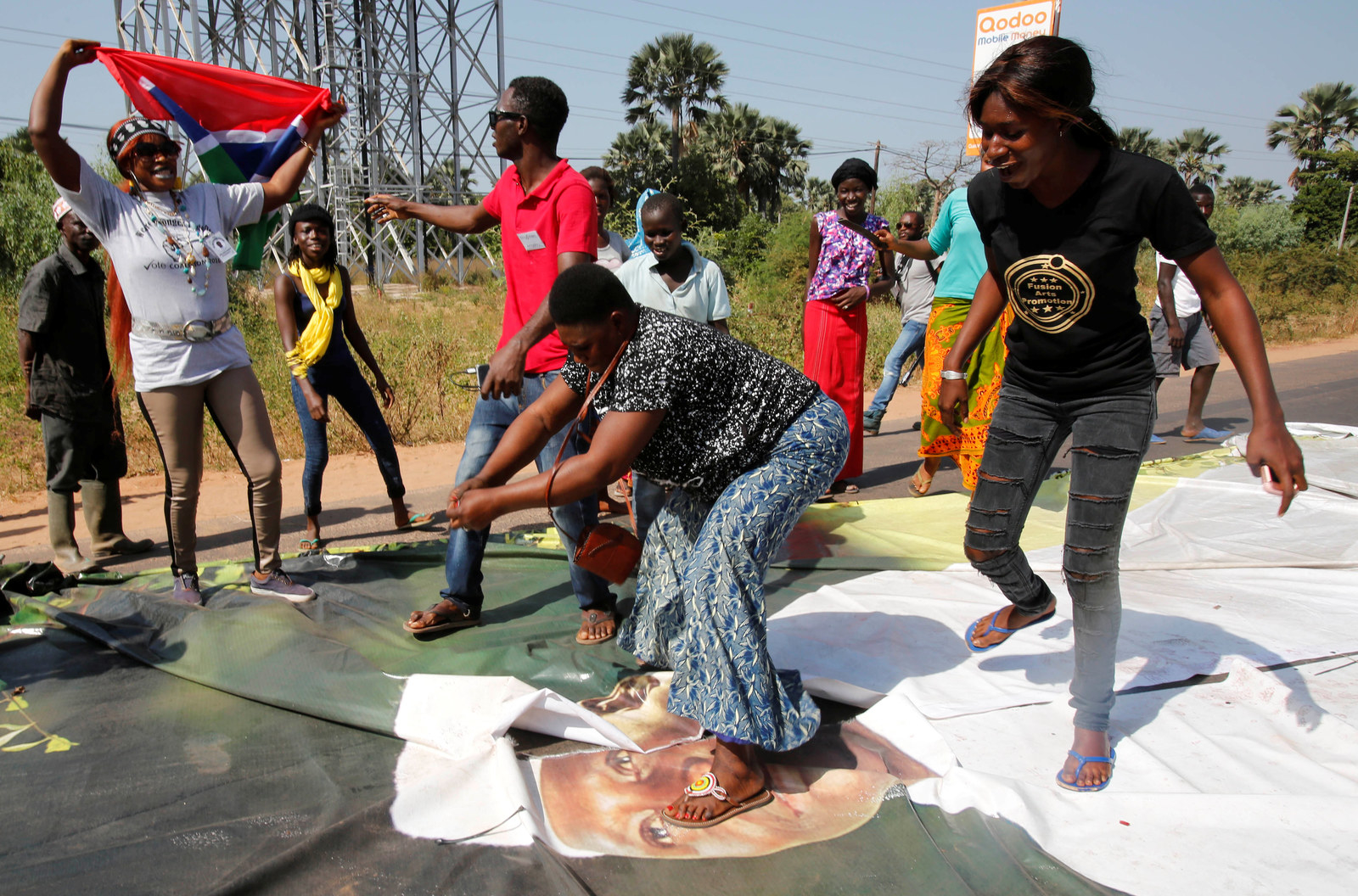
For many like Jarjue, nothing will bring back the lost years or erase the trauma. “You can easily forgive, but you can’t forget. Once in a while, it will come back in my mind and I just feel really down,” said Jarjue, as the enormity of the results dawned on him. “Four years and five months in prison is a long time.”
On March 19, 2008, the last time he saw Jammeh, Jarjue had brought him breakfast, waiting until the president was seated to serve him. The next he heard from his boss was at midnight when he was presented with an edict — delivered through an orderly — to vacate the premises within 24 hours.
He packed his bags and went to his village. Security officials knocked on his door there the next day and told him to report to the police station.
“They asked me, 'Do you know why you’re here?' They said, 'You wanted to poison the [first] family.' I laughed. I said, 'Look, when would I do that? I’m always followed by a bodyguard, even when I serve food.'”
He spent almost 12 months in an overcrowded jail cell. He was never officially charged, or allowed access to a lawyer. After being released for two weeks, he was rearrested again.
This time he spent a further 41 months in prison, much of it in solitary confinement. But as he celebrated Jammeh’s defeat, he preferred not to dampen the mood by talking about his time in Mile 2 prison, a detention center so brutal it’s been singled out by the UN even among the country’s notorious penal system.
One afternoon in June 2012, with no warning, his tiny cell door was opened and he was told he was free to go. “We have been directed to release you,” a justice department official told him.
Jarjue went to visit his parents’ graves. Both had died while he was in prison. Then, the next day, he fled to Dakar.
For a long time, like many others who’ve fled to neighboring Senegal, Jarjue remained convinced the president had sent his feared Junglers — a private army of some two dozen men — to hunt him down. Only recently has he stopped changing locations every few weeks. Still, nowhere he’s settled has ever truly been home. That’s finally going to change.
“I’ll be going back on the day he hands over,” he said, holding back tears. “I’m just feeling so great. So, so great. I’ve really missed my family.”
Celebrations in Gambia

